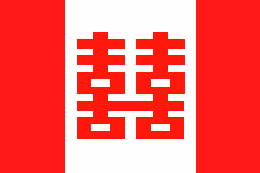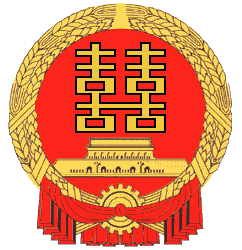Difference between revisions of "The Xheng Federation"
(→The Imperial Parliament (government structure)) |
|||
| Line 20: | Line 20: | ||
== The Peaceful Revolution == | == The Peaceful Revolution == | ||
| − | {{Image|http://upload.wikimedia.org/wikipedia/en/ | + | {{Image|http://upload.wikimedia.org/wikipedia/en/9/91/National_emblem_of_the_People%27s_Republic_of_China.png|left|The Imperial Seal of the Imperial Stratagem|The Imperial Seal of the Imperial Stratagem}} |
The Peaceful Revolution as it was called was ushered in by a very non-peaceful event. The terrible Xheng-Kiev war destroyed much of Shang-Xheng province and showed the people the horrors of warfare. The Emperor ordered an immediate investigation and funded many think tanks, and the results were simple: The Arch-Imperium in itself was fundamentally flawed in its existance. To hold supreme executive power in the Emperor and to have an elected democracy were not compatible. The Emperor immediately ordered a massive number of reforms to be performed by massive collection of leaders in various fields from commerce to military expertise, enviornmentalism and humanitarianism. Even actors and musicians were consulted on what to do with the nation. | The Peaceful Revolution as it was called was ushered in by a very non-peaceful event. The terrible Xheng-Kiev war destroyed much of Shang-Xheng province and showed the people the horrors of warfare. The Emperor ordered an immediate investigation and funded many think tanks, and the results were simple: The Arch-Imperium in itself was fundamentally flawed in its existance. To hold supreme executive power in the Emperor and to have an elected democracy were not compatible. The Emperor immediately ordered a massive number of reforms to be performed by massive collection of leaders in various fields from commerce to military expertise, enviornmentalism and humanitarianism. Even actors and musicians were consulted on what to do with the nation. | ||
Revision as of 23:41, 16 March 2006
The Xheng Federation is the successor state to the Arch-Imperium of The Xheng Dynasty. It a federation of 10 provinces.

| |
| Flag of The Xheng Federation | |
| Motto: With Heaven's Blessing | |
| No Map Available Yet | |
| Region | Europa |
|---|---|
| Capital | Xi'an |
| Official Language(s) | English, Chinese, |
| Leader | His Imperial Majesty the Xheng Emperor |
| Population | 11.3 Billion |
| Currency | Imperial-Euro |
| NS Sunset XML | |
Contents
The Dynasty
The Imperial Family, the Xheng Dynastic line still holds the official role of a royal family and heads of state. The Xheng Emperor himself is the formal head of state of the nation and in practice and protocol, everything his ministers do, is in in his name and officially his decision but in practice as a constitutional monarchy the true power is within the government itself. The Dynasty has no true political powers anymore ever since The Peaceful Revolution.
See main article, see History of the Xheng Federation
The Peaceful Revolution
</div>The Peaceful Revolution as it was called was ushered in by a very non-peaceful event. The terrible Xheng-Kiev war destroyed much of Shang-Xheng province and showed the people the horrors of warfare. The Emperor ordered an immediate investigation and funded many think tanks, and the results were simple: The Arch-Imperium in itself was fundamentally flawed in its existance. To hold supreme executive power in the Emperor and to have an elected democracy were not compatible. The Emperor immediately ordered a massive number of reforms to be performed by massive collection of leaders in various fields from commerce to military expertise, enviornmentalism and humanitarianism. Even actors and musicians were consulted on what to do with the nation.
</div>After more than a year of isolation the Arch-Imperium's once reknowned diplomatic corp was disbanded and all foreign ambassadors expelled from the nation, the Arch-Imperium went into self-imposed isolation. Its military was significantly downsized and the nation was forced to re-evaluate its future.
The result was a massive movement of executive powers from the Emperor himself to the Imperial Proxy, now also a merged position with the Prime Minister. The Imperial Stratagem was also reorganized into two main branches and the Emperor made into a formal head of state performing ceremonial roles rather than exercising actual true political authority. This self enablement would have not been possible without a monarch who was willing to surrender his powers.
The Peaceful revolution also had a significant impact on the social culture of the nation. The Peaceful mentality of the Han, Choson and Nipponese people now was far more relevant than wars. They looked upon war as inhumane and disgusting and went to great lengths never to experience one again. The nation itself became highly pacifistic. Though the nation did still have a very large law enforcement sector consuming nearly 20% of the national budget it was necessary to maintain order. The military on the other hand was downsized significantly.
The Imperial Parliament (government structure)
</div>The Imperial Stratagem was renamed the Imperial Parliament. The Parliament still had two functioning chambers, the Hall of Deputies and the Hall of Councilors. However the upper house, the Hall of Councilors and their 300 councilors were elected on regional basis.
The 10 Imperiums were renamed Provinces, and every province was entitled to elect 30 councilors each for the chamber of councilors. To stagger the electoral system, only 10 could be elected at a time, and they all sat for 6 year terms. Every two yearrs the Hall of Councilors would have elections for 1/3 of its members.
The Hall of Deputies remained mostly the same with little change except now the Imperial Proxy, now the Prime Minister was present to answer direct questions and introduce legislation.
The Council of Princes was stripped of political power, at much distress to the Aristocracy but the people appreciated it. It was also made as a forum for anyone to be appointed as peerage appointments for the government or those who have performed excellently in the eyes of the Federation.
See main article, see Government of the Xheng Federation
Federation Forces
The downsizing of the military lead to a 1/10 size of its previous establishment. Though the Federation Army, Navy and Airforce were all still formidable they were strictly defensive and professional. Elite armed forces were prefered over a civilian militia. The disbandment of so much of the military lead to huge unemployment at first but the military funding was picked up quickly by the growing movement of International Humanitarian Aid.
See main article, see Military of the Xheng Federation
Humanitarianism
Much of the military hardware was stripped of its weaponry and converted to humanitarian aid. The Xheng Federation contributes more to foreign aide than the other nations of the region with great ease. After the horrors of the Xheng-Kiev war, the Xheng people have seen the terrible consequences and wish to help all those in need. As a result, the "military personel" that once numbered in the millions became field medics, doctors, construction workers who devoted time from destroying towns, to building schools and homes. The Xheng fleets were scrapped and in their place civilian merchant ships were used to deliver aide bearing the Xheng Icon, a symbol of neutrality and humanitarianism.
Foreign Affairs
Officially and in practice, the Xheng Federation is a neutral state. It signs no alliances and abstains on the majority of European Union votes. It withdrew from previous political engagements but this does not prevent it from speaking its opinion on international affairs. It simply states that its opinions are non-binding and that they should be considered in context to its neutralism.
The neutral stance of the Federation has allowed many refugees into its borders for safety. Though it is by far not the most powerful nation in the region it has enough influence to guarentee its safety with its neutral stance, recognized by many powerful nations.
Though it does not participate much in political debates, the Xheng Federation is a staunch supporter of enviornmental issues and the Olympic movement. It was the nation that introduced the concept of the Olympic Truce, embraced by many nations and it is also a great center for the arts, architecture and commerce.
Political Parites
- Union Socialist Party
- Progressive Party
- Liberal Democratic Monarchist Coalition
- Conservative Alliance
- Traditionalists Party
Links
See also:



